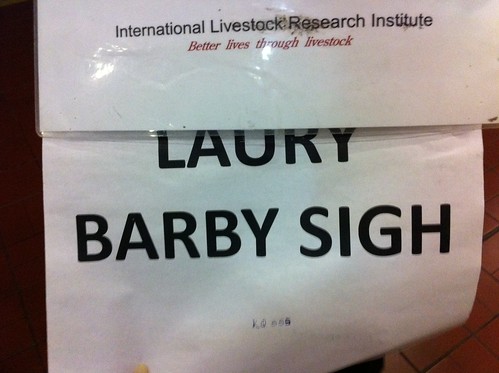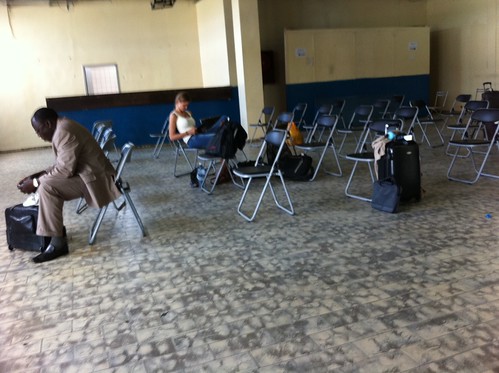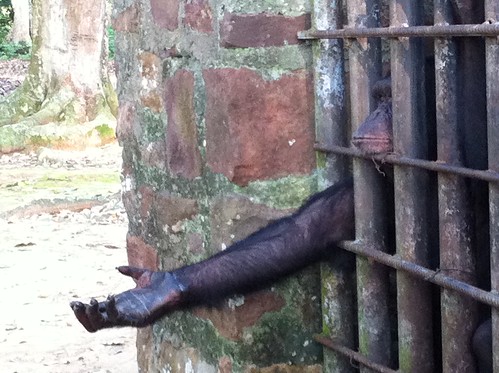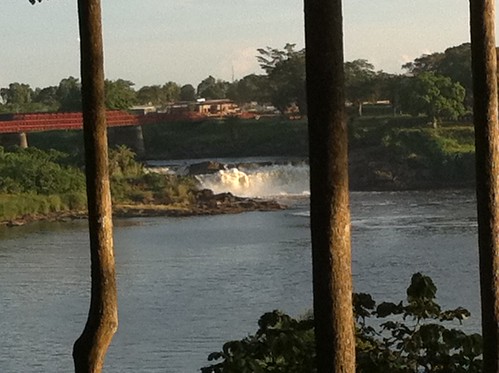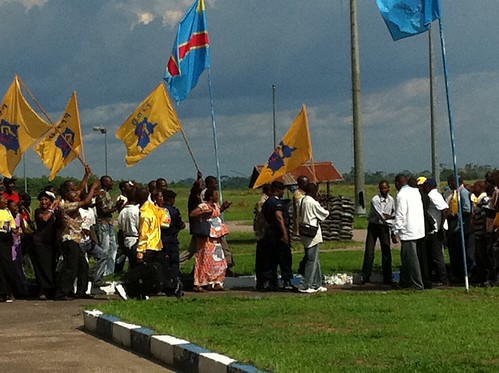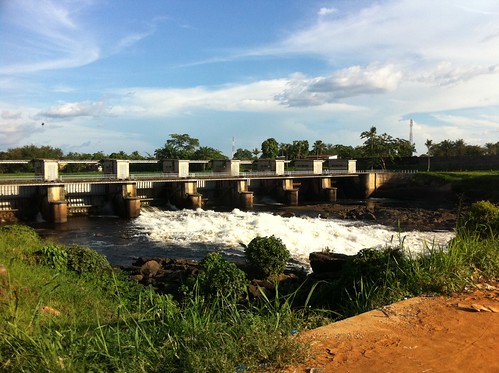Sigh! (and to think that Lizzie spelled it for them too!!)
Wednesday, April 20, 2011
Kisangani Airport "Lounge"
My home for nearly 4 hours of delays and waiting yesterday.
Freddy
This chimpanzee has lived most of his life in the Kisangani Zoo, alone. I'll write up a more comprehensive update to Cleve's Kisangani Zoo report from 2009, but Freddy is certainly suffering.
PPRD Visit
Political party candidates visiting Kisangani is a big deal - parade at the airport!!
J'avais oublié
Monday, 6:43 am
I had forgotten the chill of the air in the morning, as it rolls off the river, fat and moist and cold.
I had forgotten the hazy glow of a cavernous room, lit from above by a single bulb
I had forgotten the thick woody smell of Kisangani, where most still cook by fire, and bricks are made in towering mounds that pulsate with heat.
I'd forgotten the angry hum of the generator, constantly buzzing in the background, eager not to be forgotten because it is your only source of electricity or light as the night enters Kisangani and permeates every room of the house.
I had forgotten too the hot stickiness on the back of my neck, sleeping against a foam mattress in the stagnant heat of the night and sweating through my hair.
Yet I imagine most people in Kinshasa never experience these things, for while this is the Congo that I love most, the morning clattering with birds and rustling and cocks crowing, it is nothing like the capital city, hot and dry and brown.
Our trip to Kisangani yesterday felt long. We woke up at 5 to get things done before we left, and the airplane at noon was delayed because pilots were missing, and they kept piling us onto and off of the bus that only went 200 meters to the plane and back to the hollow lounge. The airport itself is chaotic, as men scream at each other and it reverberates in the huge cement room, and everyone is keen to "help" as they surround you. Official workers are not always in official uniforms, and I find that, to preserve my sanity, I tend to outright ignore about 90% of what is said to me.
Travelers in the US complain of body scans, but flying in Congo is far more invasive. There is a security check at every door, and at least 4 doors before you even reach the lounge. Each check wants not only your passport and ticket, but your Ordre de Mission, your visa, your profession, your origin, how long you are staying, and each man eyeballs you as though you couldn't possibly be flying for any reason but SIN! Or anti-government treachery.
Even just to leave the airport on your flight, you need a "Go Pass". For domestic flights, it costs $15 for the privilege of leaving Kinshasa, but for international flights, it costs $50.
Can you imagine traveling anywhere in the US where they needed your stated purpose for traveling, written by your employer, stamped and signed and sealed? And had to pay just to leave??
My bags were searched twice by white-gloved "agents" who, unlike their counterparts in the Western world, scoured even the bottom of my bag with a hungry, eager look in their eyes. It's hard to believe that something is forbidden on the plane when the first question they ask is "what is this?"
After much scowling and arguing, they walked away with only my Tom's toothpaste and 2 batteries, so, if you're in Kinshasa and want some Tom's, check the markets near N'jili today.
It's about a 2 hour flight between Kinshasa and Kisangani, but it feels a world away. Kinshasa has few trees left, but Kisangani has them in abundance, surrounding the airport, flanking the roads. Kisangani is a relatively big town, but it still feels quiet and wild. Though it is considered one of the "big" cities of Congo, we have no electricity right now because there hasn't been any for 2 weeks.
Along the river from the front stoop where I sit, surrounded by verdant green, I can see an old street lamp and birds flying into it, as it may no longer work to provide light but can still provide shelter. Just over the wall of the compound is a tall pole with tattered remnants of a Congolese flag, fluttering in the cool morning breeze.
I wish I got to spend more time here, but I know I will be able to next time.
Until we meet again, Kisangani
- Posted using BlogPress from my iPad
I had forgotten the chill of the air in the morning, as it rolls off the river, fat and moist and cold.
I had forgotten the hazy glow of a cavernous room, lit from above by a single bulb
I had forgotten the thick woody smell of Kisangani, where most still cook by fire, and bricks are made in towering mounds that pulsate with heat.
I'd forgotten the angry hum of the generator, constantly buzzing in the background, eager not to be forgotten because it is your only source of electricity or light as the night enters Kisangani and permeates every room of the house.
I had forgotten too the hot stickiness on the back of my neck, sleeping against a foam mattress in the stagnant heat of the night and sweating through my hair.
Yet I imagine most people in Kinshasa never experience these things, for while this is the Congo that I love most, the morning clattering with birds and rustling and cocks crowing, it is nothing like the capital city, hot and dry and brown.
Our trip to Kisangani yesterday felt long. We woke up at 5 to get things done before we left, and the airplane at noon was delayed because pilots were missing, and they kept piling us onto and off of the bus that only went 200 meters to the plane and back to the hollow lounge. The airport itself is chaotic, as men scream at each other and it reverberates in the huge cement room, and everyone is keen to "help" as they surround you. Official workers are not always in official uniforms, and I find that, to preserve my sanity, I tend to outright ignore about 90% of what is said to me.
Travelers in the US complain of body scans, but flying in Congo is far more invasive. There is a security check at every door, and at least 4 doors before you even reach the lounge. Each check wants not only your passport and ticket, but your Ordre de Mission, your visa, your profession, your origin, how long you are staying, and each man eyeballs you as though you couldn't possibly be flying for any reason but SIN! Or anti-government treachery.
Even just to leave the airport on your flight, you need a "Go Pass". For domestic flights, it costs $15 for the privilege of leaving Kinshasa, but for international flights, it costs $50.
Can you imagine traveling anywhere in the US where they needed your stated purpose for traveling, written by your employer, stamped and signed and sealed? And had to pay just to leave??
My bags were searched twice by white-gloved "agents" who, unlike their counterparts in the Western world, scoured even the bottom of my bag with a hungry, eager look in their eyes. It's hard to believe that something is forbidden on the plane when the first question they ask is "what is this?"
After much scowling and arguing, they walked away with only my Tom's toothpaste and 2 batteries, so, if you're in Kinshasa and want some Tom's, check the markets near N'jili today.
It's about a 2 hour flight between Kinshasa and Kisangani, but it feels a world away. Kinshasa has few trees left, but Kisangani has them in abundance, surrounding the airport, flanking the roads. Kisangani is a relatively big town, but it still feels quiet and wild. Though it is considered one of the "big" cities of Congo, we have no electricity right now because there hasn't been any for 2 weeks.
Along the river from the front stoop where I sit, surrounded by verdant green, I can see an old street lamp and birds flying into it, as it may no longer work to provide light but can still provide shelter. Just over the wall of the compound is a tall pole with tattered remnants of a Congolese flag, fluttering in the cool morning breeze.
I wish I got to spend more time here, but I know I will be able to next time.
Until we meet again, Kisangani
- Posted using BlogPress from my iPad
Location:Kisangani, à coté de fleuve
Sunday, April 10, 2011
Waiting for Transport
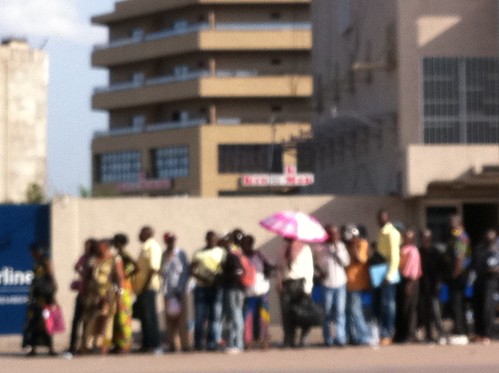 |
| Midday on the Boulevard, No Means to Get Home |
To accommodate all this traffic, Chinese engineers have flooded Kinshasa, engaged in road building and construction enterprises, attempting to modernize the dusty unpaved roads and put in proper drainage systems to save the new roads from rainy season.
The city is full of its own systems too -- secret hand signals and noises that alert individuals to the presence or need for goods and services. People at the side of the road lazily hold their hands out, index finger extended, and twirl it around, as though pointing to a dog chasing its own tail. It means that they need a taxi. People selling water make a kissing noise, perhaps to remind you that your lips are parched and in need of some of their delicious refreshing maji.
The men selling sodas clink their metal bottle openers against the glass, and it's a sound that travels quite a distance easily. Other services, like a traveling shoe shine man, makes his own noise. While I've seen the traveling pedicure man at work, I've yet to hear his call, but I am curious to know what it could be!
The Boulevard, the main road down the center of Kinshasa, had once been a lazy avenue of trees -- flanked with landscaping to escape the dusty urban grit. But this past year, the trees were cut down, the grass removed, the landscaping abolished, and the Boulevard was transformed into an 8-lane superhighway!
It's amazing to drive down this highway, partially because there is no posted speed limit, but also because it is an extremely high quality road that seems to not take into account the needs of the hundreds of thousands of pedestrians that Kinshasa is replete with. Zebra stripes (crosswalks) were painted to help people cross the Boulevard, but in reality, people must dart frantically across this enormous mid-city highway, day or night, and cars rarely stop or slow down. It's hot, and dusty, and barren, and the sun bouncing off of the stark concrete compound walls and shop fronts gives little reprieve to passers-by. The trees are gone, and the grass and flowers, and Kinshasa has achieved its goal of feeling less like a town and more like a city.
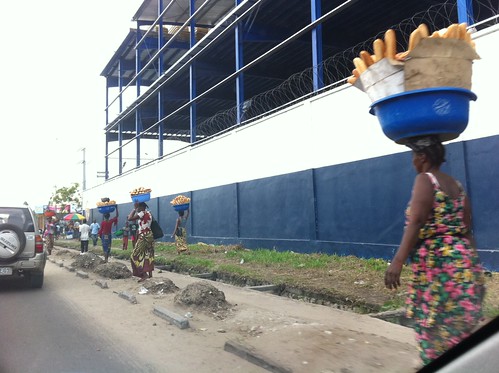 |
| Bread Mamas -- all heading away from the bakery |
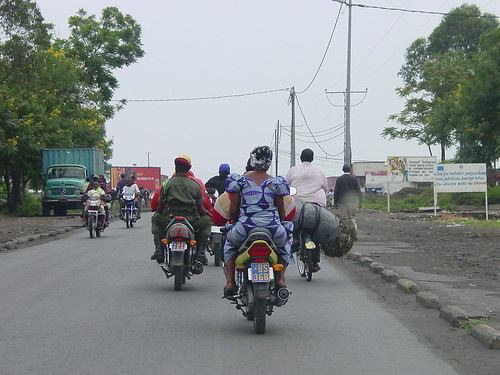 |
| Bicycle Taxis in Goma, DRCongo (Photo I took in 2006) |
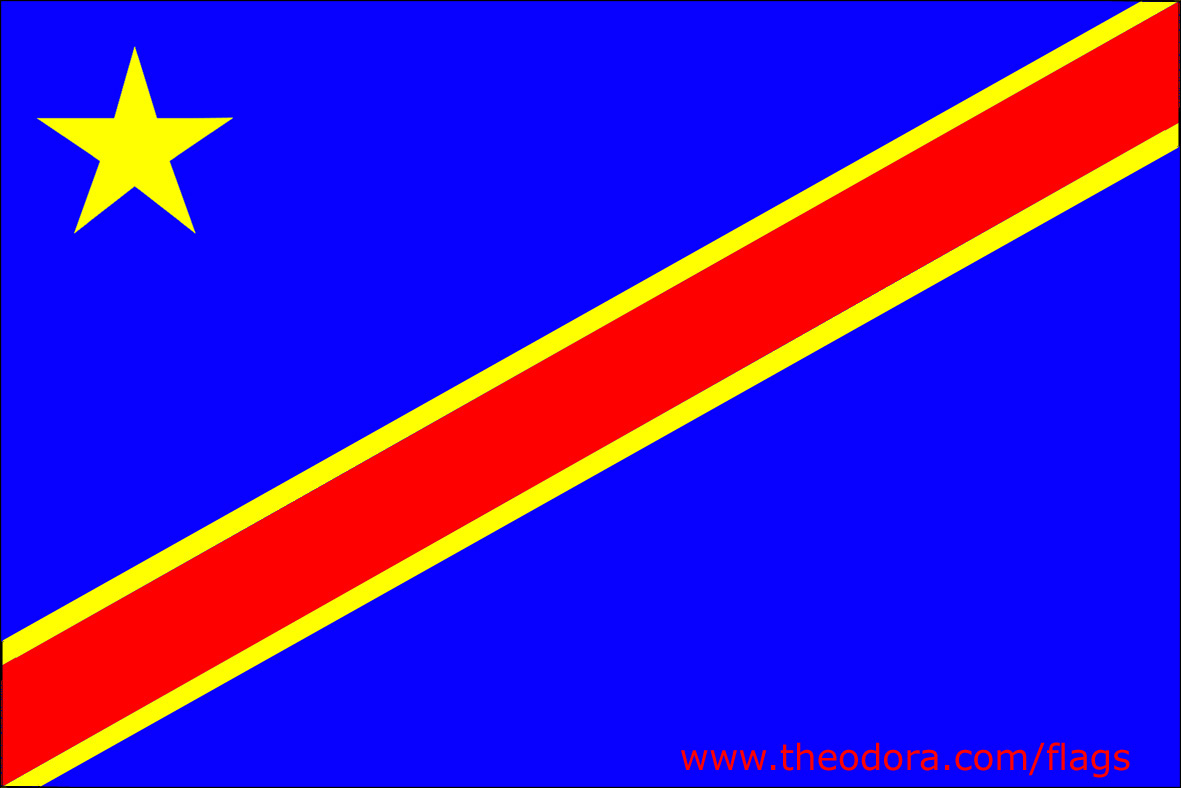 |
| The amended flag of 2006 (the red stripe was added) |
Because, despite the rust, and the doors falling off their hinges, and the windows made of tape or plastic bags or cardboard or some combination of all three, these vans continue to run, because they MUST continue to run. As Kinshasa continues to grow and expand, giving more economic opportunities to the Congolese, the necessity of travel, especially over longer distances, taxes the current privately-owned transportation system. And, as a result, during peak travel hours, I have seen upwards of 100 people waiting at the side of the road, baking in the sun, waiting for a van with available seats to come along.
 |
| All these people are waiting for transport |
I asked a couple taxi men why there weren't more minibus taxis being bought to accommodate the extra need. Money. Credit. And Stability. Getting credit to buy a minibus here is nigh impossible, because a country that has only just enjoyed "stability" (or a local approximation of it) for the last couple years isn't really the ideal locale for a loan. Gas is expensive. Repairs are expensive. The roads that aren't the boulevard take a toll on the wheels, the alignment, the undercarriage because they're so bad and riddled with potholes. Few people have the means to set up a minibus enterprise, and, for the time being, the government isn't doing anything to help them out. So people wait.
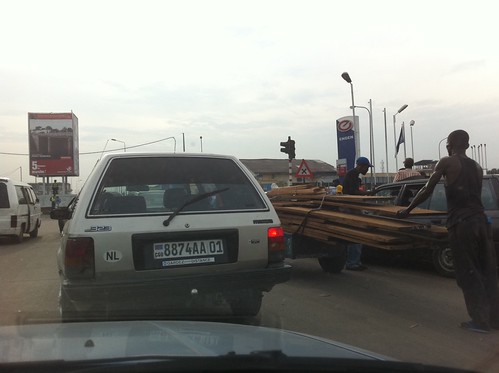 |
| Push-pushes, cars, and me, waiting at a non-functioning traffic light in Kinshasa |
I look forward to continuing to work in DRC and seeing how Kinshasa ends up addressing some of these issues. If the elections this November go smoothly, perhaps creditors will be more willing to lend here, and the cogs of independent infrastructure that have sprung up to deal with other needs of a big city will address the transportation issue. In the interim, people make due! Like this guy, who needed a ride while traveling with lots of parcels, but couldn't find space!
 |
| Stuntmen get paid extra for this |
Here is a minibus, the conductor hanging out the side (as is usual), stopping to pick up passengers at the side of the road:
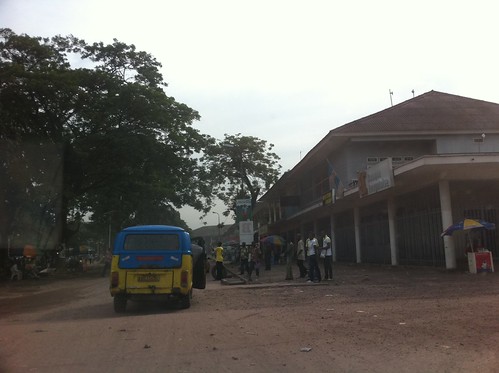 |
| Most minibus taxis are painted blue and yellow like this one |
Ibiza at Midnight
Kinshasa is a huge, vibrant city, and one would think that, considering the number of expatriates here that the ensuing synthesis of cultures would make for incredible fun. And sometimes, as with the integrated salsa culture here, it does!
We spent part of Friday night at Ibiza Jazz Club, a smokey and small club in downtown Kinshasa that is apparently ONLY open on Fridays nights. What they do with the venue during the rest of the week, I don't know, but it definitely explains why a Gin & Tonic is $15.
Ibiza was packed, though, and filled with excitement and energy as people grooved, transfixed to the beat. There was a curly-haired expat saxophonist and an older expat guitarist (who was AMAZiNG), and they came and went, as other musicians pinch hit. The conga drummer, a burly guy, looked enraptured, leaning his head back as shook all over with the fervor of the music.
A mix of Latin music, scat, African -- every type of music flowed through Ibiza on Friday night. It felt a bit like a movie speakeasy, with the requisite hipsters, hair slicked back and sunglasses indoors, sprawled on the curved couch with a foxy lady on either side of them.
There was proper salsa-style dancing at the end of the night, as the huge crowds trickled away and left some space on the dance floor for movement. A good night, and a lovely presentation of Congolese nightlife.
Friday, April 8, 2011
Happy 70th Birthday to My Mom!
 |
| My mom, in her natural habitat, knitting before my wedding. ©CKGillette |
My mom bailed me out, saving not only me, but all of the people who were dependent on me! She's a generous spirit, a wonderful person, and deserves nothing but happiness and cake today!
Please share with me today a celebratory huzzah for this woman who saves chimpanzees by proxy! Without her I don't know where I'd be!
Wednesday, April 6, 2011
MONUC Plane Crash in Kinshasa
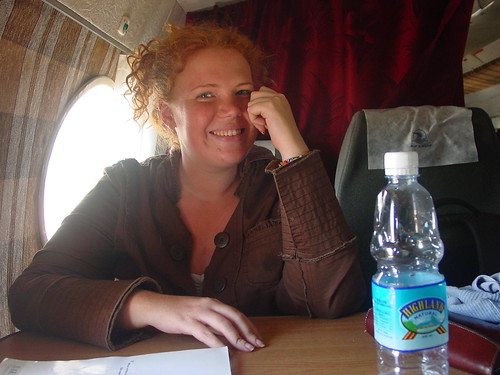 |
| Flying on a UN plane from Entebbe to Goma in 2006 |
Lots of the commercial airlines here use extremely old planes, and there is constant fear that they will just fall out of the sky or erupt full of crocodiles or maybe just slowly fall into pieces and one will be left, cartoon-style, sitting in one's seat all by itself as it careens along through the sky with no more plane around it.
But the MONUC flights are supposed to be better than that. Crocodile-free, even. I've flown with the UN over ten times already, and even though the planes were laughably dated -- the plane in the above photo had wood-paneling and ancient, faded orange shag carpeting -- I figured that the UN wouldn't be using it if it weren't in good shape.
 |
| UN Copter over Goma |
Lots of aid workers fly around DRC with UN flights sometimes several times in a single month. I think the recent crash will make everyone wary for a while, and will certainly make MONUC stricter about adhering to weather advisories. I actually filmed the storm that downed this plane, and that can be watched here.
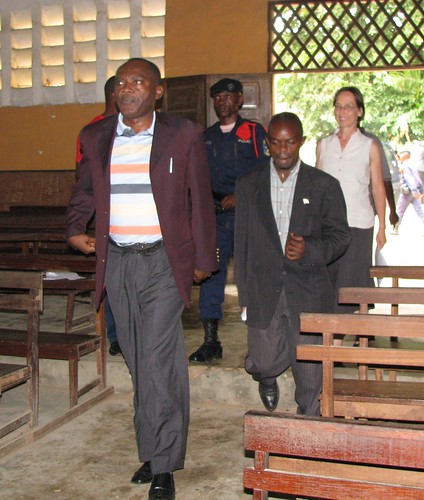 |
| Mendes Masudi, in front, at a TL2 Workshop in Kindu |
From Terese's blog:
As vice-governor he was our strongest ally in the provincial government. He pushed hard to get the first no-hunting season established. He wanted six months with no hunting and no bushmeat in the market. Finally a three month season became law.
It was his staunch support that gave credibility to the case for conservation of Maniema’s rich Lomami hinterland. Congo’s forests have lost an advocate. Alas.
Remettez le Bonobo
During my meeting yesterday with Minister L, a man was apparently brought in who had been trying to sell a bonobo. Minister L and I were discussing the dangers of pet ape trafficking, and he said, sort of offhandedly, "We have a bonobo here right now -- do you want to see it?"
It's always alarming to be confronted with a situation such as this one. A bonobo or chimpanzee, removed from its family and its natural habitat, is an awful thing to see. If you can imagine a tiny human orphan, starved, too-skinny, wild eyed and being massed by people and picture its fear, it comes close to the terror experienced by great ape orphans. For we all look huge, and unfamiliar, and terrifying, as most human experience for great apes involves hunting by the humans and fleeing by the apes.
It was therefore incredibly reassuring when the door opened and Fanny walked in, Fanny whom I met early in my Kinshasa visit when I went to Lola Ya Bonobo. To know that the appropriate people were already aware of the situation and that it was being handled immediately eased my sense of alarm.
 The bonobo was brought into the office, terribly skinny, and already suffering from some of the side-effects of prolonged dehydration. I stayed 5 meters away, to prevent spreading any of my own disease, as many orphans succumb to disease soon after they are confiscated. Two of our orphans in Aketi did, and one of the effects of not having been able to eat or drink for 5 days.
The bonobo was brought into the office, terribly skinny, and already suffering from some of the side-effects of prolonged dehydration. I stayed 5 meters away, to prevent spreading any of my own disease, as many orphans succumb to disease soon after they are confiscated. Two of our orphans in Aketi did, and one of the effects of not having been able to eat or drink for 5 days. But most others crowded around the baby, and his look of terror was awful. Despite living in Congo, most Congolese have never been outside of the major centers like Kinshasa, and therefore have never seen firsthand some of the megafauna that Congo is full of. Curiosity and excitement brewed in the office as people clamored around the grated windows, standing on their tippy toes, straining for a peek.
Fanny had brought a variety of fruits, and the bonobo, confronted with the bounty, immediately grabbed a banana and began eating ravenously. It's a good sign when the feelings of hunger overwhelm the feelings of terror, as many confiscated orphans are too scared even to eat. But it doesn't always ensure survival or success. The bonobo cried loudly, a sound that, in the wild, would bring his mother to his side immediately to comfort and protect him, but without a mother, he was left to cry alone, his mouth, overstuffed with banana, frozen in a grimace of fear and submission.
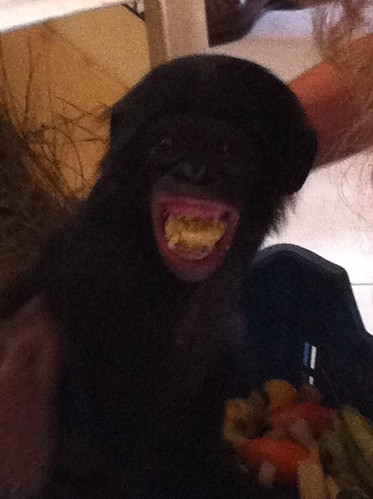 Fanny made sure that all of the documentation was provided from Minister L, legally signing over guardianship of this orphan to Lola Ya Bonobo. It is SO important here, as I've mentioned many a time in this blog, to have les documents. It's what saved me on the airstrip when we were trying to escape Aketi.
Fanny made sure that all of the documentation was provided from Minister L, legally signing over guardianship of this orphan to Lola Ya Bonobo. It is SO important here, as I've mentioned many a time in this blog, to have les documents. It's what saved me on the airstrip when we were trying to escape Aketi. It seemed to take forever, though, the process of making copies, reading everything over, again and again, and finally signing the papers and utilizing the all-important embossed stamp that makes a hand-written piece of paper a legally-binding Congolese document.
Thank goodness that Fanny left when she did, as the original proprietor of the bonobo returned, requesting money or that Minister L "Remettez le bonobo" (give him back). Another crowd ensued, which thankfully dispersed after only 30 minutes, but the tension was high as we finished our meeting.
At the end of the day's events yesterday, I left inspired to do more -- and hoping fervently that this tiny baby bonobo survives. I will of course update on both counts.
- Posted using BlogPress from my iPad
Sound the Alarum
I am a whistle blower.
It's a dangerous occupation here in Congo, where lots of the people who are corrupt are able to be so because of connections with higher-ups, but failing to circulate the reports of bad behavior is akin to condoning it in my mind.
Dian Fossey was a whistle-blower too, and everyone knows what happened when her whistle blew too loudly too often and people got tired of hearing it.
Yesterday I finally got to meet with a relatively well-connected member of the Ministry of the Environment here in Kinshasa. I was given his contact information from an influential conservationist that I met in Kyoto last year, to give you a sense of the power of collaboration and networking even here in Congo.
Lots of the government positions here are often arbitrary titles; men assigned to duties who might not necessarily care about their wards, making collaboration difficult if not impossible.
Most (not all) of the men I encountered, tasked with protecting the environment in Aketi fell into that basket, making my impassioned pleas on behalf of the chimpanzees I was trying so desperately to save that much less effective.
Yesterday, however, I told Minister L exactly what I'd witnessed in Aketi. I told him about the 44 orphans that Cleve and I had witnessed over the course of a little more than a year. I told him about the elephant and chimp meat in the markets, about the men who traveled along the main roads, without fear, their bicycle baskets laden with the distinctively smelly elephant meat, and yes, I told him of stories I'd heard of ladies in the market, paying off the local environment minister in order to continue selling illicit meats.
It could have gone terribly. Minister L could have taken it as a critique of his country, of his government, but the look on his face when I told him these tales suggested otherwise. He seemed genuinely horrified and appalled, and listened with rapt attention.
I don't hate his country, and he understood that. I've worked here now for over two years, and he saw my passion to protect its patrimony. I told him about my research, and he understood that I hope to safeguard the miners from disease as much as the chimpanzees. My French isn't by any means perfect, but he understood that the real problem in north Congo is that no one knows what's happening there, and therefore no one has the information to stop it.
One policeman on every major road (of which there are no more than 4) would inhibit the easy trafficking that happens now, and Minister L and I formulated a plan to meet with the local chiefs and ministers not only to educate but get such a regulation in place. It is now a distant goal, since it needs to be proposed, funded, structured, planned, but the fact that it was in great part his idea, and that HE seemed so passionate about it, motivates me to move forward with it as early as I can.
So often, the sense of infantilism seems to inhibit intuitive problem-solving here in Congo. If some NGO or some expat or some country will come in and plan it all and do it, why bother to even theorize? Yet there are some here who are capable, and motivated, and need only the structure and the means. It's important to support that, and after the productivity of my meeting yesterday, something that I feel committed to doing.
- Posted using BlogPress from my iPad
It's a dangerous occupation here in Congo, where lots of the people who are corrupt are able to be so because of connections with higher-ups, but failing to circulate the reports of bad behavior is akin to condoning it in my mind.
Dian Fossey was a whistle-blower too, and everyone knows what happened when her whistle blew too loudly too often and people got tired of hearing it.
Yesterday I finally got to meet with a relatively well-connected member of the Ministry of the Environment here in Kinshasa. I was given his contact information from an influential conservationist that I met in Kyoto last year, to give you a sense of the power of collaboration and networking even here in Congo.
Lots of the government positions here are often arbitrary titles; men assigned to duties who might not necessarily care about their wards, making collaboration difficult if not impossible.
Most (not all) of the men I encountered, tasked with protecting the environment in Aketi fell into that basket, making my impassioned pleas on behalf of the chimpanzees I was trying so desperately to save that much less effective.
Yesterday, however, I told Minister L exactly what I'd witnessed in Aketi. I told him about the 44 orphans that Cleve and I had witnessed over the course of a little more than a year. I told him about the elephant and chimp meat in the markets, about the men who traveled along the main roads, without fear, their bicycle baskets laden with the distinctively smelly elephant meat, and yes, I told him of stories I'd heard of ladies in the market, paying off the local environment minister in order to continue selling illicit meats.
It could have gone terribly. Minister L could have taken it as a critique of his country, of his government, but the look on his face when I told him these tales suggested otherwise. He seemed genuinely horrified and appalled, and listened with rapt attention.
I don't hate his country, and he understood that. I've worked here now for over two years, and he saw my passion to protect its patrimony. I told him about my research, and he understood that I hope to safeguard the miners from disease as much as the chimpanzees. My French isn't by any means perfect, but he understood that the real problem in north Congo is that no one knows what's happening there, and therefore no one has the information to stop it.
One policeman on every major road (of which there are no more than 4) would inhibit the easy trafficking that happens now, and Minister L and I formulated a plan to meet with the local chiefs and ministers not only to educate but get such a regulation in place. It is now a distant goal, since it needs to be proposed, funded, structured, planned, but the fact that it was in great part his idea, and that HE seemed so passionate about it, motivates me to move forward with it as early as I can.
So often, the sense of infantilism seems to inhibit intuitive problem-solving here in Congo. If some NGO or some expat or some country will come in and plan it all and do it, why bother to even theorize? Yet there are some here who are capable, and motivated, and need only the structure and the means. It's important to support that, and after the productivity of my meeting yesterday, something that I feel committed to doing.
- Posted using BlogPress from my iPad
Location:Avenue Colonel Mondjiba,Kinshasa,Democratic Republic of the Congo
Subscribe to:
Posts (Atom)
